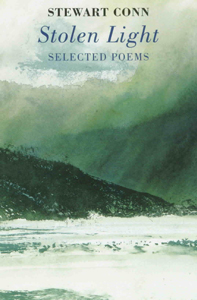|
A shiver crosses Loch Stenness Lead-shot from a blunderbuss The impulse to run A friend is writing poised on the edge: On Craigie Hill The farmhouse seems centuries ago, Before that even, I could visualise (from coloured The last link broken, the farm-buildings stand
|
Buy this title at Amazon
|
What the critics say
Conn is strikingly responsive to every variety of Scottish landscape [while tapping] a prolific vein of love poems, tributes, elegies and epithalamia for friends and relatives, which gives us an unusually three-dimensional view of the poet as social being; culminating in a sequence in commemoration of Iain Crichton Smith, begun in journal form during his last illness, which recreates Crichton Smith's own luminous parish in an affecting mood of reverence for il miglior fabbro. Painters and fellow-poets have plainly been Conn's spiritual guides; and his friendship with Crichton Smith can only have been deepened by their shared belief in the redemptive powers of art. His later preoccupations converge in the long sequence "The Luncheon of the Boating Party" , which wittily animates the Renoir painting in the voices of its various models. It is an implicit endorsement of Renoir's own retort, in resisting the fashion for sordid subject matter, "There is enough ugliness in the world without the artist adding to it". It stands up both as a human interpretation of the painting, and a celebration of the painter's voluptuous sublimation of the human, which transcends his own fragility and rescues us from the mercies of Time. — Gerald Mangan, Times Literary Supplement
One of the excitements of reading Stolen Light is in following the movement from the confident technical assurance of Stewart Conn's early poetry to a time when the poems catch up with the present and he probes uncertainty and doubt… He is in the broadest sense a seeker and a maker of meanings. The title itself suggests not only the illuminations of nature and art, but the brevity of life; the darkness that surrounds us. Stolen Light bears a rich harvest of signs and wonders from the natural world… a poetry central to 20th-century experience, his concerns vital to any understanding of recent sad events in Europe. However in the battle between ice and light it is light and love, though "at the mercy of flights/as hazardous as those of gold leaf" which triumph in the end. — Tom Pow, The Scotsman
His poetry is austere, though not devoid of playfulness. It is also economical with imagery, and highly emblematic, yet occasionally flamboyant. Above all, it is highly distinctive, and rock-solid in its integrity… A sensitivity to how relationships grow and develop, yet always at the mercy of the precariousness of life, is what makes Conn's landscape poems other than merely picturesque. — Mario Relich, The Dark Horse
Poem after poem looks hard at what it means to be a human being, at the mercy not only of time and fate, but the inexplicable forces within us. But his vision is not bleak. There is a sense of redemption: through art, but above all through the attentiveness of the human heart. —
Raymond Friel, Southfields
